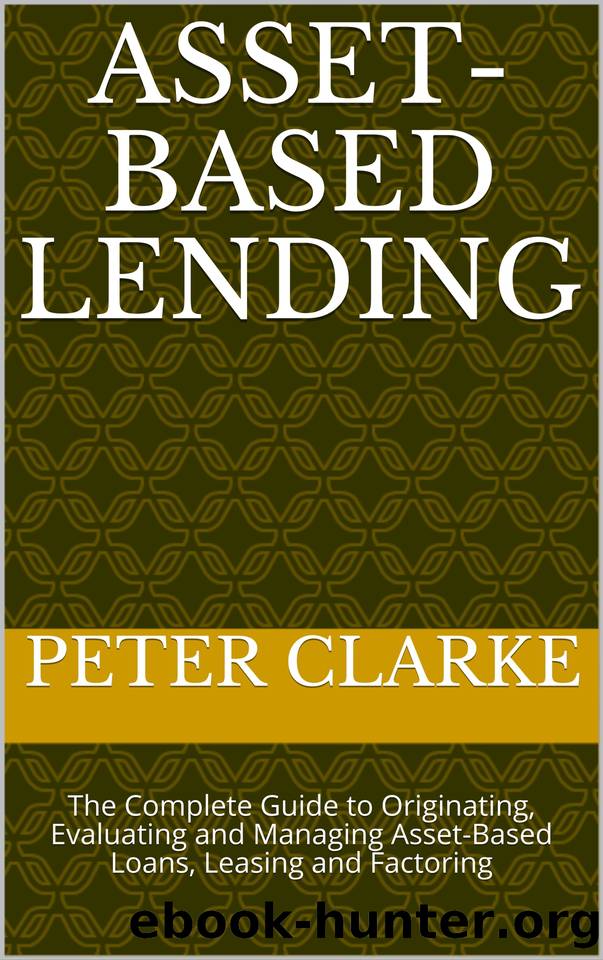Asset-Based Lending: The Complete Guide to Originating, Evaluating and Managing Asset-Based Loans, Leasing and Factoring by Clarke Peter

Author:Clarke, Peter [Clarke, Peter]
Language: eng
Format: epub
Publisher: leanpub.com
Published: 2017-10-09T00:00:00+00:00
10.4 ESTOPPEL (NOTIFICATION) LETTERS
You should seriously consider placing the maker/payer, or obligor, of the note on notice. This notice can be used to control the receipt of payments and require those payments due your borrower to be made directly to you as the assignee and holder of the note. If your collateral consists of either notes or chattel paper, you should evaluate whether you are subject to assuming performance obligations, warranties, and guaranties on the assignorâs part, as an assignee. Thus, you should conform to all the notification procedures as previously covered in Chapter 8, âExecutory Contracts,â Section 8.03, in order to protect you against any assertions raised by obligors/buyers of goods against assignors/borrowers involving claims or defenses (which is only helpful and applicable involving business purpose buyers and not consumer purpose purchasers).
(1) Discovering Any Infirmities
A notification letter may also act as a safety check for the bank whenever taking notes or contracts. It may be written in order to determine if any infirmities exist whereby you would be unable to take a note as a true holder-in-due-course. If an infirmity existed, it would preclude the bank, as assignee, from stepping into the shoes of the assignor by assuming its full legal rights to take any legal action it deemed necessary as if it were the assignor in its own (bank) name. However, this should not prevent the bank from being a holder of general assignment rights. In view of this fact, it is all the more necessary to have a good fabricated notification letter sent to the obligor with all the appropriate protective language in it. This may also be a good reason for obtaining notification letters acknowledged before you even disburse funds. It is important that you take the assignment of any note, or even contract, without an infirmity, because revised Article 9.318 and 9.206 of the UCC states that cutoff language and other provisions in a notification letter are enforceable by an assignee who âtakes their assignment for value, in good faith, and without notice of a claim or defenseâ unless such provisions are outlawed by any state statute or decision that might establish a different rule.
(2) FTC Restrictions Relative to Consumer Goods
Consumers are protected under the Federal Trade Commission (FTC) âanti holder-in-due-course trade regulationâ rule. Whenever you take an assignment of consumer goods, you cannot rely on any cutoff language in notification letters when a consumer asserts any defense or claim against an assignor/dealer, distributor, retailer, or supplier of consumer goods. The government, therefore, restricts any assignor or assignee, such as the bank, from preventing any consumers from asserting any claims or defenses over product defects, warranties, and guaranties, regarding purchased goods for consumer purposes. As a matter of fact, sellers of consumer goods involving chattel paper or notes must provide a stamp on this paper evidencing this FTC, âanti holder-in-due-courseâ rule. Hence, notification letters are only protective involving commercial business transaction purposes. As a lender, you now may have to provide such stamped notices on
Download
This site does not store any files on its server. We only index and link to content provided by other sites. Please contact the content providers to delete copyright contents if any and email us, we'll remove relevant links or contents immediately.
Rich Dad Poor Dad by Robert T. Kiyosaki(6607)
Pioneering Portfolio Management by David F. Swensen(6288)
How To Win Friends and Influence People by Dale Carnegie(4498)
The Money Culture by Michael Lewis(4198)
The Dhandho Investor by Mohnish Pabrai(3758)
The Wisdom of Finance by Mihir Desai(3731)
Liar's Poker by Michael Lewis(3441)
Fooled by Randomness: The Hidden Role of Chance in Life and in the Markets by Nassim Nicholas Taleb(3105)
The ONE Thing by Gary Keller(3063)
The Intelligent Investor by Benjamin Graham Jason Zweig(3035)
Mastering Bitcoin: Programming the Open Blockchain by Andreas M. Antonopoulos(3035)
The Psychology of Money by Morgan Housel(2970)
Investing For Dummies by Eric Tyson(2948)
Rich Dad Poor Dad: What The Rich Teach Their Kids About Money - That The Poor And Middle Class Do Not! by Robert T. Kiyosaki(2948)
How to Day Trade for a Living: Tools, Tactics, Money Management, Discipline and Trading Psychology by Andrew Aziz(2942)
How to Win Friends and Influence People by Dale Carnegie(2909)
Market Wizards by Jack D. Schwager(2696)
How to Pay Zero Taxes, 2018 by Jeff A. Schnepper(2646)
Zero Hour by Harry S. Dent Jr. & Andrew Pancholi(2644)
